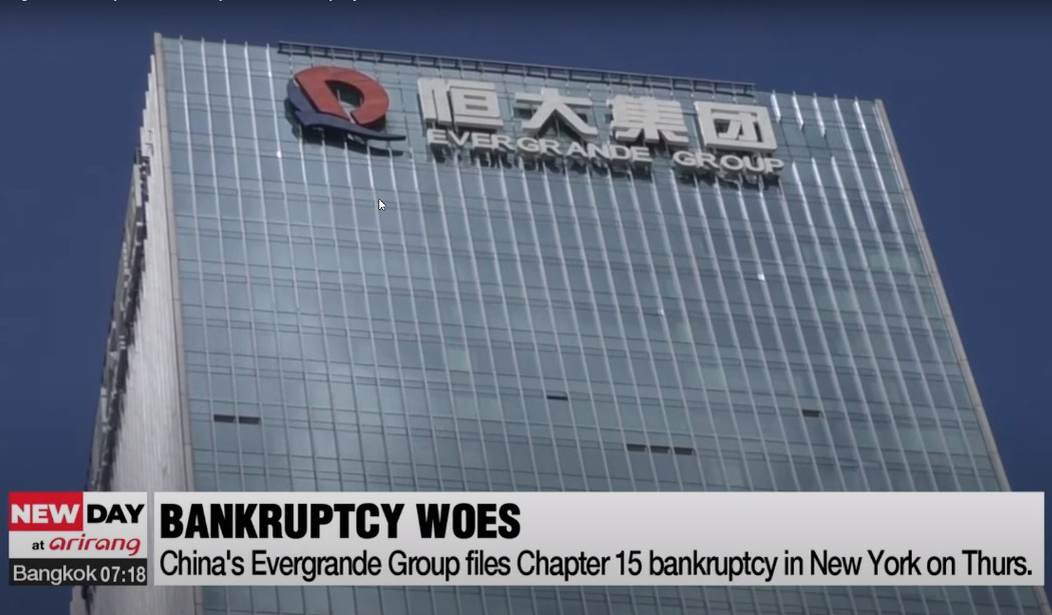Evergrande Group, one of China's largest real estate conglomerates, filed for Chapter 15 bankruptcy in New York Friday after failing to make interest payments on $84 million in off-shore bonds. The company reported liabilities of $340 billion against $256 billion in assets. Evergrande Group has been a darling of those tempted to invest in China. Over the past few years, it has branched out from real estate into ventures such as professional sports, entertainment, and finance.
Chapter 15 bankruptcy is similar to Chapter 11, where the debtor is asking for protection against creditors while it attempts to un-f*** its business model and continue with operations. Except with Chapter 15, the company is based in a foreign country and has assets in the United States.
This is not a trivial action. Evergrande's debt represents 2% of China's GDP. When you consider that real estate comprises 30% of that GDP, you can see the magnitude of the problem.
For the people who suffered fecal incontinence when Sam Bankman-Fried's cryptocurrency Ponzi scheme brought down Silicon Valley Bank (Silicon Valley Bank CEO Sold $3.6M in Stock Before Collapse, Mysteriously out as Fed Reserve Board Member), I'd suggest stocking up on brown trousers and getting Depends put on an Amazon recurring delivery list.
Evergrande owes money to about 171 domestic banks and 121 other financial firms. There will be consequences for the banking system. A credit crunch could follow, analysts fear, which would be bad news for China and the global economy. https://t.co/mAg1a5G6Sh
— Kath (@mopeng) August 17, 2023
How did Evergrande go bankrupt? In the words of Ernest Hemingway, "Gradually, then suddenly."
In recent years, Evergrande has become an emblem of China’s real estate crisis.
In 2021, under the weight of $300 billion in liabilities, Evergrande defaulted on its debts, sparking a string of defaults at other building companies. Analysts described the Chinese government’s approach to Evergrande as a “controlled demolition,” in which authorities allow the company to continue operating as they guide it through a gradual collapse.
Last month, the company disclosed losses of $81 billion over 2021 and 2022.
Since China’s real estate debt crisis began in mid-2021, companies accounting for 40 percent of Chinese home sales have defaulted, according to Reuters. As a result, many homes have been left unfinished and suppliers and creditors left unpaid. Real estate is responsible for a quarter of economic growth in China; property investment declined 7.9 percent in the first half of 2023.
Country Garden, another major developer in China, recently missed payments on its multibillion-dollar debt, further rattling home buyers in the world’s second largest economy.
The Chapter 15 move by Evergrande may be a case of putting a bandaid on a sucking chest wound.
The filing is a necessary step in Evergrande’s attempts to restructure its $32 billion of foreign-held debt, and eventually get back to normal operations.
Chapter 15 protection lets foreign companies apply for U.S. bankruptcy protections for proceedings that largely happen overseas. If courts approve the plan, U.S. assets of the Chinese company would be protected from creditors trying to dispute the restructuring.
Evergrande had to file for Chapter 15 protections under U.S. law, reports Reuters citing unnamed sources familiar with the subject.
In March, Evergrande announced a restructuring deal that would offer its creditors either new long-term bonds, or a mix of shorter-term bonds and equity-linked instruments.
The equity-linked instruments would be backed by shares in Evergrande, or its property services and electric vehicle units, separately listed in Hong Kong.
Evergrande needs three-quarters of its creditors to endorse the restructuring plan, with hearings held later this month in Hong Kong, the British Virgin Islands, and the Cayman Islands.
Getting that agreement from creditors is critical. Evergrande already faces several lawsuits since it defaulted on its debt in December 2021, including a winding-up petition in Hong Kong which, if successful, would immediately liquidate the company’s assets.
The hearing for that petition is scheduled for Oct. 30, after the results of Evergrande’s restructuring negotiations.
As creditors have already seized a $1.6 billion high-rise in Hong Kong owned by Evergrande as well as the Evergrande headquarters and the personal mansion of Evergrande's Hong Kong chairman, its overseas creditors may be less than inclined to cut a deal when they are uncertain about the ability of Evergrande to survive in China.
Keep an eye on Country Garden; it is following the same glide path as Evergrande. It, and several other real estate investment groups, may fail even if Evergrande survives, but they will definitely fail if Evergrande goes under.
For a look at the bigger picture, I'd recommend this video.
Keep in mind the data used in this video are official Chinese numbers, which means they are a) fake and b) when the fake data produced by a totalitarian state is bad, rest assured that the real numbers are worse.
Inevitably, this bankruptcy — and those waiting in the wings — will have a huge impact in Europe, which before COVID had started to resemble a Chinese satrapy. It will also hit Wall Street, where money managers never seem to have the curiosity to ask what they are investing in so long as the quarterly gains are there.
In a worst-case scenario, this sh**show will finish its gestation period just about when the presidential primary season starts to gain intensity.
[Author's note: I mistakenly attributed the failure of SVB to the failure of FTX. My apologies and thanks for the commenters to corrected me.]













Join the conversation as a VIP Member